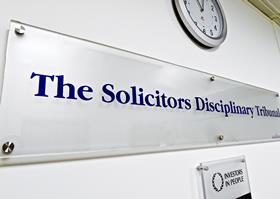A veteran solicitor who concealed his bankruptcy from his firm and from the regulator for six years has been struck off the roll.

Stephen Simmons, admitted in 1980, said that he believed the bankruptcy was a personal matter unrelated to his practice, but the Solicitors Disciplinary Tribunal said this was not credible. The tribunal said the eventual sanction could have been avoided and described the case as having a ‘tragic dimension’.
‘[Simmons], who in all other respects had been a highly capable, diligent and competent solicitor with over 40 years’ experience in the profession, had no doubt encountered serious problems,’ said the ruling. ‘His decision to conceal those problems instead of making frank disclosures to his firm and regulator was an error of judgment.
'Whilst not a given', the judgment stated, had Simmons taken the appropriate action he might have been allowed to continue practising, 'albeit with safeguards in place'.
Simmons, who practised with Hertfordshire firm Brightstone Law, had previously been bankrupt in the early 1990s and entered an individual voluntary arrangement in 2009 when he owed £150,000 to HM Revenue & Customs. He was made subject to a bankruptcy order in 2014 but failed to disclose this to the Solicitors Regulation Authority: he also failed to tell the regulator about a 2015 bankruptcy restrictions undertaking.
His practising certificate was automatically suspended due to the 2014 bankruptcy but he continued to practise until 2020. The SRA said Simmons had knowingly provided incorrect financial information on three occasions and made a deliberate decision to conceal his bankruptcy.
Read more
Simmons submitted that he was now 75 and had four decades’ experience as a solicitor. He had a strong work ethic and he provided good service to his clients, building a strong following and a reputation for being a competent, hard-working solicitor. However, he had had ‘setbacks’ as partner with a previous firm and faced personal financial struggles.
He believed it was an entirely personal matter and a personal problem, and not something which was related to or affected his practice as a solicitor or his work for the firm. He concluded that his clients would not need to know about the bankruptcy as he could continue to provide them with the same level of service that he had always provided them.
The tribunal found all five allegations proved including dishonesty, adding: ‘The reasons behind any bankruptcy do not provide an exclusion for the imperative to disclose its fact to the regulator.’
The SRA incurred costs of around £40,000. Considering the sanction it had imposed, Simmons’ limited means and earning potential, his age and health, the tribunal made no order for costs.






























